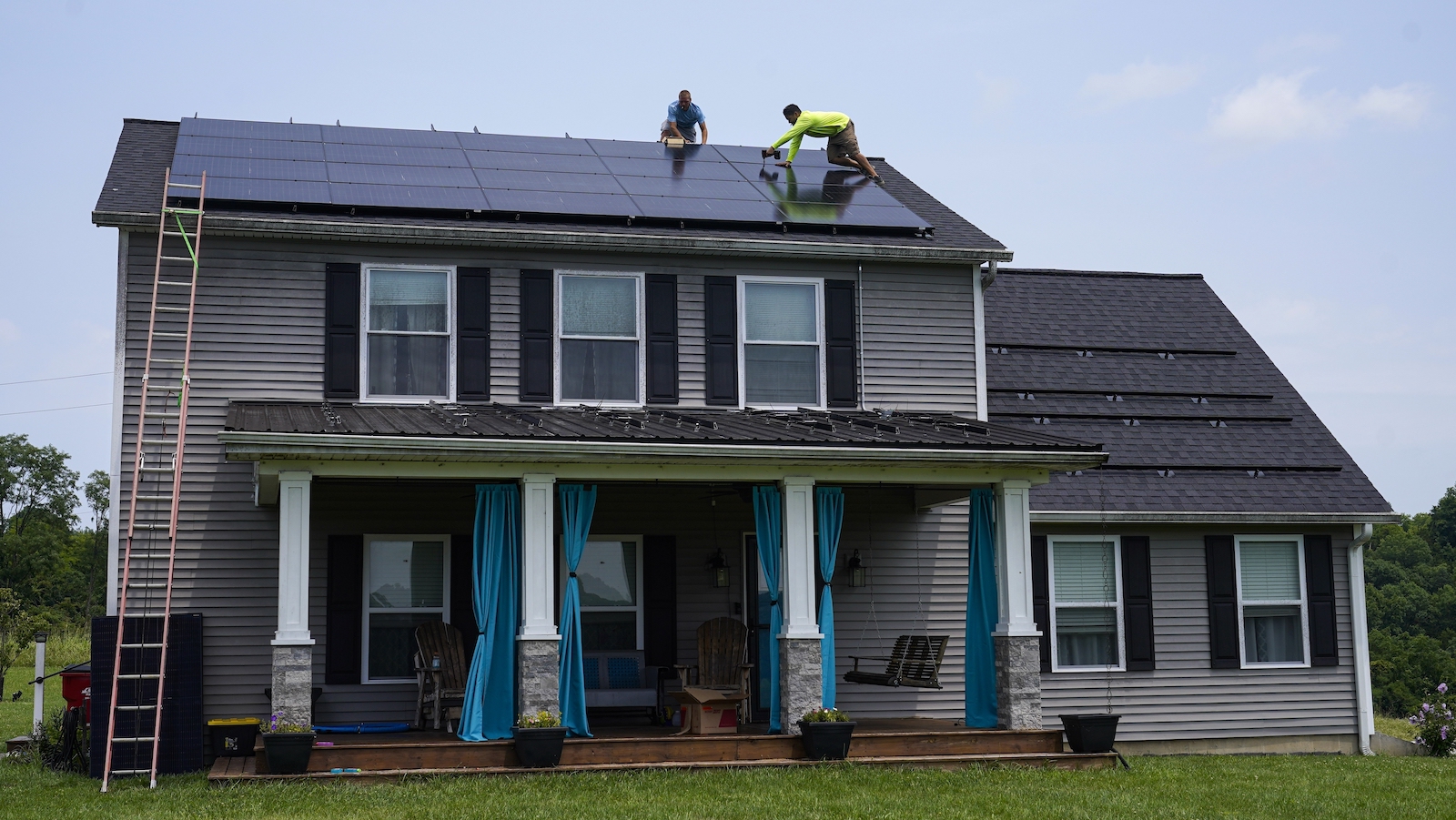Michigan homeowners associations say yes to rooftop solar panels

This coverage is made possible through a partnership with Grist and Interlochen Public Radio in Northern Michigan.
Anyone wanting to install solar panels on their roof has many things to consider: sunlight, costs, and coordination with contractors and utility companies. Tens of millions of people across the country also have to consider their homeowners association.
A new law in Michigan aims to remove this obstacle by requiring homeowners associations (HOAs) to allow solar panels on their roofs.
The Homeowners’ Energy Policy Act was signed by Governor Gretchen Whitmer on Monday.
“We wanted to find a way to … give homeowners the ability to make those decisions for themselves,” said Ranjeev Puri, a Democratic representative from Canton Township in southeast Michigan and the bill’s lead sponsor. “I think this is an important step for a lot of people.”
The law gives many HOA members the opportunity to install solar panels on their roofs and implement a range of other energy-saving measures, from clotheslines to heat pumps. HOAs must also adopt a solar energy policy within a year and cannot enforce standards that increase installation costs by more than $1,000 or reduce energy output by more than 10 percent.
It does not apply to shared roofs and common areas; multi-family houses and some condominiums are therefore not affected by the legislation.
HOAs are becoming increasingly common; according to the Foundation for Community Association Research, over 75 million people are members of an HOA.
Supporters say Michigan’s new law is a step toward making rooftop solar more accessible to many of Michigan’s 1.4 million HOA members.
“We thought this was a very important bill because there are thousands of homeowners associations across the state,” said John Freeman, executive director of the Great Lakes Renewable Energy Association. “From our perspective, it was completely absurd that … homeowners moving into a neighborhood governed by a homeowners association agreement would not be allowed to install solar panels on their roofs to generate their own electricity and help reduce carbon emissions.”
Michigan lags behind in total solar capacity, ranking 26th nationally. With this legislation, it joins more than two dozen other states that have some form of “solar access” laws, including neighboring states like Illinois and Wisconsin that aim to limit associations’ say in solar energy in their community.
HOAs generally try to maintain a neighborhood’s property value by adopting and enforcing rules known as codes, covenants and restrictions. In addition to providing maintenance and other services, HOAs can use these rules to shape the aesthetics of a neighborhood, such as requiring that homes be a certain color or yards have a certain look. Violations can result in fines or even foreclosure.
And their regulations can discourage people from adopting climate-friendly practices such as growing native species or switching to more sustainable energy systems, further increasing the logistical and financial hurdles to residential solar energy use.
Dan Kramer, a biology professor at Michigan State University, co-authored a 2022 study in the journal Landscape and Urban Planning on how homeowners associations hinder—and promote—sustainable housing development in central Michigan.
“They could be bridges to more sustainable housing development rather than obstacles like they are now,” he said. “And I think it just takes a little bit of a change in perception and maybe a little more openness on the part of the HOAs.”
Kramer began researching HOAs because he wanted to build a home in Central Michigan, something small and energy efficient with renewable energy and without large, grass-covered Race.
“I kept having the problem that my house was too small or that my plan to use solar panels or do the landscaping I wanted was not acceptable to the homeowners association, so I just had to keep looking,” he said. “That kept happening to me in my personal search for a piece of land to build a house on.”
Some HOAs support sustainability efforts. For example, associations in Arizona have advocated for desert-friendly landscaping and regulated water use. But Kramer said the cases they studied in central Michigan are rare.
“I don’t think HOAs have any kind of anti-environmental or anti-sustainability agenda,” he said. “I think it’s more about the idea of a neat and well-maintained neighborhood. And that’s tied to property value.”
Opponents of the new law fear it undermines the rights of associations to determine what happens in their community. They include the Community Associations Institute, a national organization that advocates for the interests of HOAs.
Attorney Matt Heron, co-chair of the institute’s Michigan branch, said the law could also make roof maintenance and repair more difficult.
“There will be communities that may lose their insurance coverage because they can no longer insure everything,” he said. He believes it would have been better to encourage energy efficiency measures rather than mandate them.
By law, HOAs have some say in these projects, such as limiting their height and appearance on the roof. And some associations have already encouraged solar energy, such as the Ashland Park No. 1 Association in Traverse City, which has pushed to set up a system for residents who want solar panels.
“We just didn’t think it was a smart move to try to restrict people now while the government is trying to push renewable energy,” said Ben Brower, the association’s president. Brower said they would be careful in the future about what they still have control over: “We don’t want this to disfigure the property or bring it into disrepute and reduce the value of neighboring properties.”
The landscape for solar energy in Michigan is changing. Last November, the state passed a law requiring all electricity to come from “clean” sources by 2040. It also allows more people to sell residential solar power to utilities. State incentives have also helped make energy more affordable.
Michigan has “a lot of catching up to do” when it comes to solar energy, says Allan O’Shea, CEO of CBS Solar, a solar installation company based in the northern Michigan town of Copemish. He has worked in the solar industry for decades and has had some good experiences with associations, but there have also been problems.
“We had a problem when in the middle of the process they actually passed a new law to prevent the implementation of solar energy. And those are declarations of war,” he said. “Not so much for us because we had to abandon the project, but it really hurt the homeowner, the apartment owner.”
For O’Shea, this law is part of that change; some of the clients who were unable to install solar due to HOA restrictions are planning to restart their project.
“Solar energy will continue to establish itself as another form, another source of energy that needs to be included in the mix,” he said.



